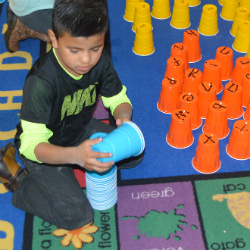Eighth-grader Luis Montes is accustomed to change. This year, that change may be a lack of change, as his family debates whether to make the annual November migration to Georgia to pick onions, pecans and peanuts — or, for the first time, to stay in Sparta through the school year.
Luis, his parents and three siblings joined a handful of the 61 migrant families in the district at Sparta’s Ridgeview Elementary in late October to celebrate the season with a fiesta of food, educational games and prizes.
Seated with his family while his younger siblings played, Luis reflected on the constant transitions since kindergarten. “At first everything was a little bit difficult,” he said. “It kept changing every year. But now it’s not that hard. I’m used to it.”
The Montes family has returned to Sparta each summer through fall to pick blueberries, peaches and apples. While Luis has shifted friends groups, he said, he’s just as excited about reuniting with friends in Georgia. “A lot of them, when I leave, they give me their phone number, or I call them on Facebook or Snapchat,” Luis said.

The harder part, Luis explained, is school. Although he’s still an eighth-grader, the school curriculums don’t always align. “It’s hard, because in my mind I have what I’m learning here,” he said. “When I move over there I have to adjust.”
Catching up
Educational Services Coordinator Susan Narvaez works to enroll migrant students and help ease a transition that she said is never perfect. With the help of the national MSIX database, migrant students’ classes can be accessed to address their transitional needs, she said.
When students arrive in Sparta, the district makes migrant families aware of day care services, job outreach opportunities, adult education for non-English speakers and sports programs. In her role, Narvaez helps recruit students from migrant camps.
Some migrant children spend 3-4 weeks out of school, as many families make multiple moves each year, Narvaez said. But because many return to Sparta, in addition to newcomers, Sparta’s recruiters make sure they’re enrolled and attending.

A long tradition
Surrounded by migrant families at a Ridgeview cafeteria table, Terry Anderson is retiring after 40 years as a recruiter. Her family tree is full of apple farmers, and she has made countless connections over the years recruiting students from the many migrant camps that populate West Michigan’s orchards.
The population has shrunk over the years, she said, as more farms contract their workers. The family send-off event used to draw hundreds of families with music and dancing, she said, but the district has downsized the celebration. Despite leaving in her professional capacity, she is not going far, as her family belongs to many local orchards. She said she will only miss the children, whom she ensured made it to school every day — no excuses.
“The program has been so strong,” she said. “I don’t make the program. The program makes itself.”
Narvaez’s family is also close to the orchards. As a child, her father worked on local farms and would take her and her siblings with him. They learned Spanish and eventually worked alongside migrants. Her husband grew up migrating, and he currently works with the Montes family at an apple orchard.
“I have always had a passion for the migrant families and getting them what they need for the short time they’re with us,” she said, “and hopefully doing as much as we can to catch them up before they leave.”
CONNECT
Sparta Educational Services Office










